-
|
05 September 2022
|Posteado en : Inf first person
Two delegations of foreign ministry and migration officials from Colombia and Ecuador arrive in Spain, on a study visit organised by the EUROFRONT programme, to learn about the border control model implemented in the Schengen area
Gema Palencia, a EUROFRONT technician, recounts the visit, which takes place between Madrid, Algeciras and Tarifa, in the form of a diary. A journey under the certainty that the only way to tackle transnational crime is through cooperation.
DAY I. 5 September 2022
There will be five days of visits to police institutions for migration management and cooperation, as well as border posts at airports and ports.
An interesting opportunity offered by the European Union programme co-led by the FIIAPP, EUROFRONT, to exchange processes and procedures, learn efficient interventions on both sides and find opportunities for collaboration that can be applied to Colombia and Ecuador and the other countries with which the programme collaborates: Argentina, Brazil, Bolivia, Peru and Paraguay.
With enthusiasm and the hope that from the meeting we will find greater opportunities for collaboration… Let’s get started!
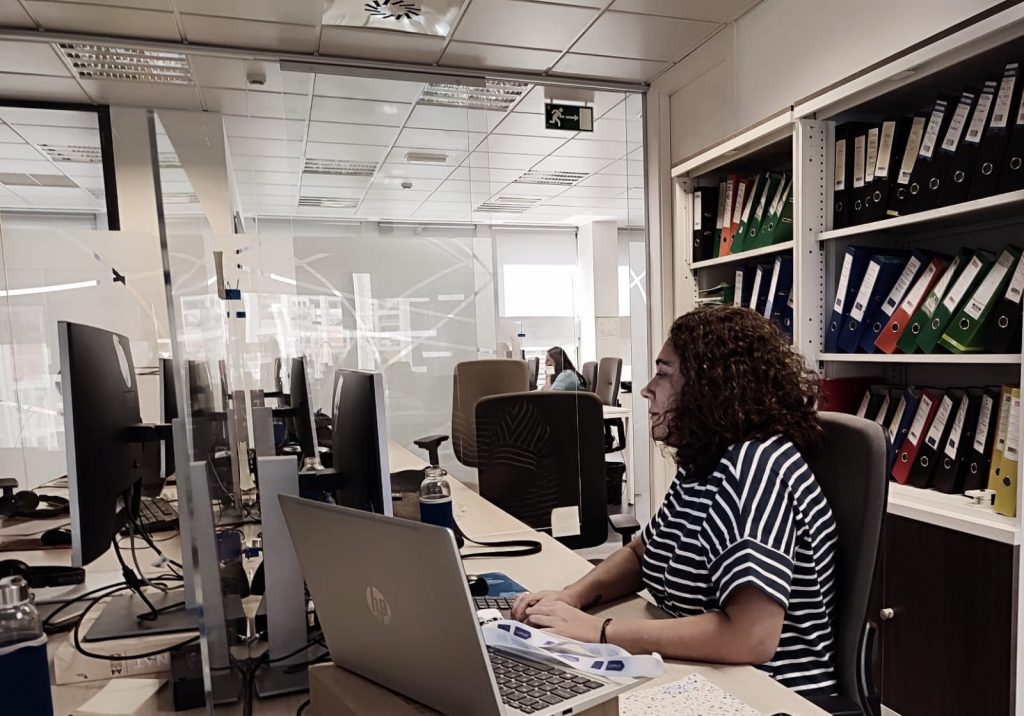
Gema Palencia, EUROFRONT technician, works in the FIIAPP office in Madrid organising the visit to Spain of delegations of foreign ministry and migration officials from Colombia and Ecuador. At the General Commissariat for Foreigners and Borders I meet the members of the delegations in person, and after numerous e-mail correspondence it is pleasant to put a face and a voice to the participants.
Despite the jet lag, they were particularly participative during the presentation by Commissioner General Julián Ávila Polo and in the subsequent presentations on the different units that make up the General Commissariat.
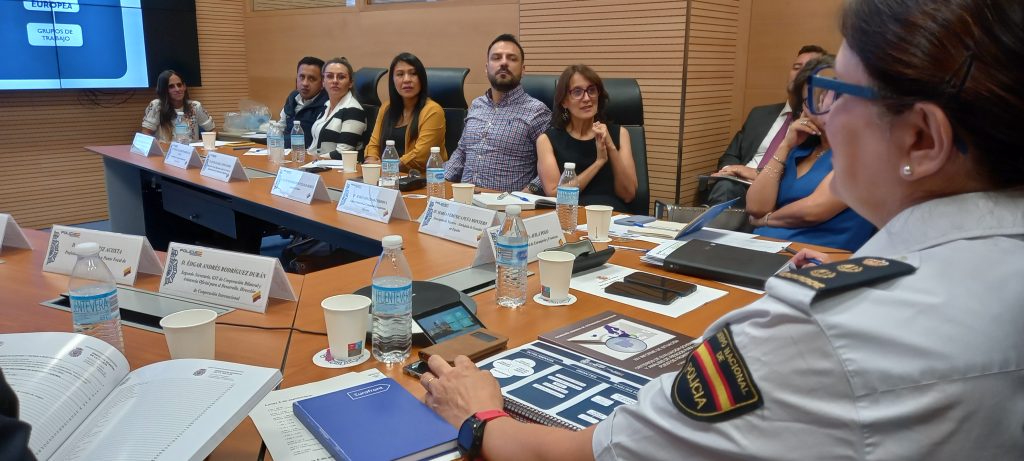
Delegations of chancellery and migration officials from Colombia and Ecuador during their visit to the Comisaría General de Extranjería y Fronteras in Madrid. Among the comments, the issue of the Venezuelan problem, common to all countries, and the exchange of information, came up for discussion. Another topic of interest is the successful experience of Punto Atenas, an operational document verification service run by experts in document forgery, which in ten months has dealt with 3,400 queries from various authorities. The idea of replicating a similar system in the Latin American region is met with great interest.
The afternoon is devoted to Barajas Airport and to getting to know in situ the operational border management in the Schengen area.
Full day 1, intense and with many open questions. We continue…
DAY II. 6 September 2022
On the way to the International Cooperation Division of the police, comments revolved around the previous day’s visit to Barajas Airport. The means of detecting forged documents or automated passages captured the most interest of the tour.
Information exchange and cooperation were the key words of Tuesday’s session. Based on the conviction that this is the only way to tackle transnational crime, the functions and effective results of the SIRENE Office, an exchange point with European police forces, as well as those of the INTERPOL and EUROPOL offices, were presented.
I continue to be surprised by the high level of interest of the delegations, and not only me, but also the rapporteurs, who are grateful to have such active participants. During his presentation, the Head of the Operational Section of the SIRENE bureau, Agustín Hernández, points out:
“A large part of today’s organised crime is transnational, therefore international police cooperation is essential to tackle it”
And among the debate arises the need to share data to combat new forms of irregular migration, and as an example, the citizens of Central Asian countries who use South American airports as a gateway to reach the United States.
The Division is also the key point of collaboration with Spanish Cooperation institutions, as it participates in the management of around 30 international projects, several of them implemented by the FIIAPP.
In the afternoon, train to Algeciras to learn about Operation Minerva and border management in the port area.
On the road…
DAY III. 7 September 2022
In the Bay of Algeciras, a sea and an ocean meet, two continents come together and cultures cross. A key point of entry to Europe from Morocco, between June and September it can see up to 2.5 million people pass through.
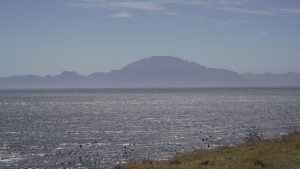
Moroccan coast as seen from Algeciras The delegations from Ecuador and Colombia have learned in situ how police teams with members of up to 17 nationalities are integrated to support the control of trafficking in persons and goods within the framework of Operation Minerva of the European Border and Coast Guard Agency (Frontex) and led by the Spanish National Police during the summer months.
This coordinated action streamlines management thanks to the specific knowledge of each country’s agents and the ease of access to their countries’ databases, which allows for rapid verification of travel documents.
An example of cooperation that has shown them the possibility of extending the current bilateral agreements that each country has with its neighbours to a regional level. The Undersecretary of the Ecuadorian Migrant Community, María Soledad Córdova, stressed that:
“The European Union is a strategic ally in border management and in addressing the challenges of migration”
They are struck by the magnitude of the movement of passengers, vehicles and goods and the effective organisational machinery in Tarifa and Algeciras, as well as the detection of irregularities and the effective cooperation that serves to alert or prevent crimes in other European countries.
It is also surprising how close Africa can be seen from the bay, much closer than it appears on the maps.
From the comments among the group and with the agents at the border, I perceive that the reflections after what we have heard and witnessed these days are taking more and more shape.
Day IV. 8 September 2022
After visiting the headquarters of the Central Unit for Illegal Immigration Networks and Documentary Forgery (UCRIF) in Madrid, we see the work on the ground in the Algeciras office.
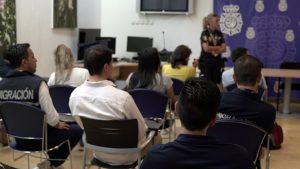
Border experts from Colombia and Ecuador during the explanations given by National Police officers at the Algeciras police station Issues detected at border controls are in many cases the thread that is pulled to unmask human or capital trafficking networks, or the clues that are shared with other international police forces, the missing piece of the puzzle to stop gangs that operate globally.
The second secretary of the Colombian Foreign Ministry’s International Cooperation Directorate, Andrés Rodríguez, points out during the visit:
“Migration challenges at the border must be addressed jointly and EUROFRONT is a programme that can provide important lessons for Colombia”
Questions about deadlines and procedures for irregular cases or the comparison of different legislations are the main part of the debate during the last day of the visit to Algeciras, in which delegations finalise all aspects related to cross-border crimes, from detection and control to investigation.
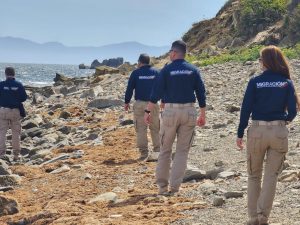
Members of the Colombian delegation observe the Moroccan coast from Algeciras And back on the train to Madrid… time for reflection. Friday’s day of conclusions looks set to be interesting.
Tomorrow we continue…
Day V. 9 September 2022
Last day….
We closed by learning about the ADEXTTRA database containing information and registration of foreigners. A swarm of interconnected databases, from various sources, which allows the cross-referencing and extraction of information of great use both for the police and for various public institutions that manage the issuance of documents and various procedures with foreigners.
The final assessment puts on the table new paths to follow in terms of training, bilateral and regional cooperation following the European model of the Athens Point, legislative harmonisation and formal follow-up, when the delegations return to their countries and the proposals to be followed are institutionally validated.
If there is one thing they all agree on, it is the positive thing of having seen that it is possible, and the high effectiveness of police and institutional cooperation, which is essential to combat cross-border crime.
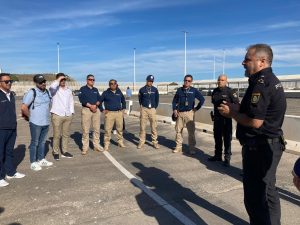
Delegaciones de Colombia y Ecuador escuchan las explicaciones durante su visita al Puerto de Tarifa The FIIAPP and EUROFRONT have also received some interesting learning. Víctor Suárez and Agustín Hernández, experts in foreigners from EUROFRONT who organised the technical visit and accompanied the delegations, emphasise how productive the exchange was and how productive it was to learn about other forms of management. They have now also noted down some highly recommendable ideas to incorporate into the processes in Spain.
The visit is over, but we are continuing with a closer and more effective collaboration, adapted to the needs of each country.
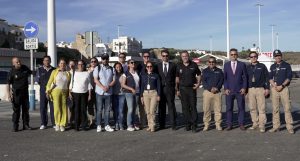
The delegations of Ecuador and Colombia pose with several agents of the National Police in the Port of Tarifa during their visit We go on…. And we are doing much better.






